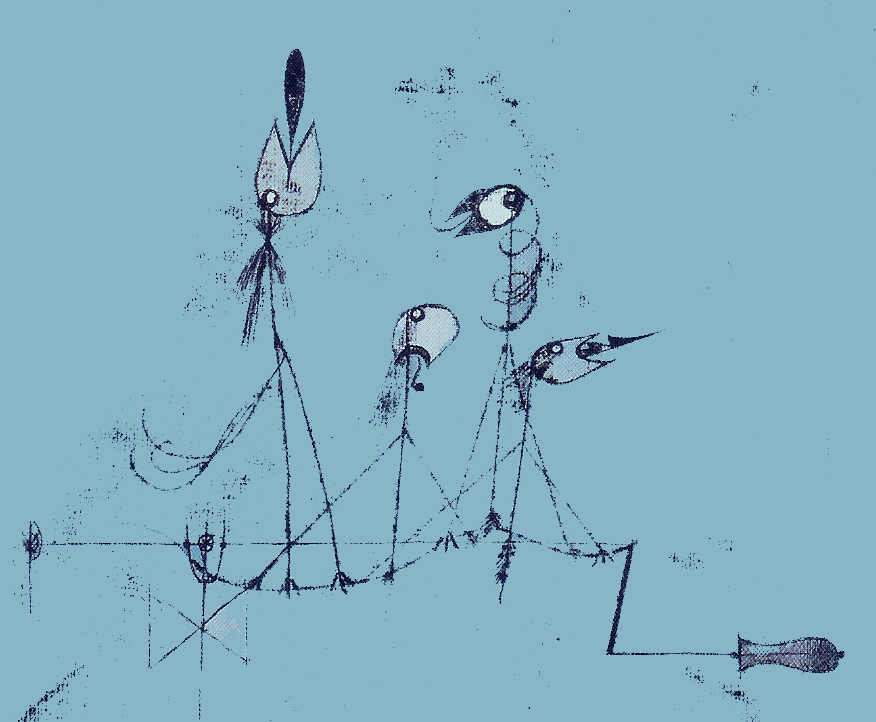The Case Against Work
I’ve long held an aversion to work.
Not that I’m lazy. I’m really not.
I’ve often been praised for my diligence, and efficiency, and for getting stuff done, and that I have; a strong sense of duty to perform, especially when I’ve agreed to do so in exchange for wages.
But I’m not always exactly thrilled about what it is I’m doing.
Sometimes the lack of a desire to work wells up from a deep moral objection. An objection that grows out of an insight. An insight into the real deleterious impact of millions of humans hard at work. And this insight necessitates, on occasion, a natural mutiny against the highly cherished cultural value called industriousness; the work ethic.
(Above: Twittering Machine, by Paul Klee)
Heck, it’s even among the modern accepted requirements for human happiness, according to psychologists; to be industrious; to have a job; to get satisfaction out of what one does. It’s hard to counter such deeply ingrained beliefs.
And… if we believe this, and at the same time admit that we can’t guarantee work for everyone, we are at least failing on our national promise to safeguard the pursuit of happiness for all our citizens. For if we have never guaranteed work for all, and structurally could never do so, even if the powers that be desired to, we are admitting that happiness is something reserved for a portion of us at best.
That’s a whole different matter, but one among a growing list of really compelling reasons I have for why work is not only way overrated, but dangerous to our survival as a species.
It all finally coalesced for me last night while listening to a course lecture by the late great co-inventor of permaculture, Bill Mollison.
He simply said, “work creates pollution”.
Now, if you were to evaluate that statement out of context from what he said before and after it, you might find plenty to argue with, especially if you hold a blind allegiance to the good old American work ethic, as most of us do.
In actuality, it is a statement informed by decades of careful observation of natural and human systems to back it; and here’s essentially why it’s true:
Nature does not create waste.
In nature, so called waste products are re-integrated into increasingly more efficient cycles, so that externalities are never permitted to arise. Nature is always complete and whole, from start to finish. Yes. That’s it. There are no externalities in nature. Yet human profits actually require the presence of externalities (waste products, pollutions, stuff that’s written off the books) to drive economic growth. And the engine that is driving this pollution is unfortunately the hard work of millions of well-meaning people.
Now doesn’t seeing the fact of that just stop you in your tracks?
It does me.
Most of the hard work I’ve done in my life I now freely admit has gone to creating pollution that is degrading the environment. What a wake up call for someone with a deep sense of dignity and self-respect for how his time is spent! I have sadly not generated much real wealth through most of this work; just a culturally determined monetary value, little of which I’ve been able to save. This in exchange for distant trees and distant rivers; distant mountains and distant oceans; vast stretches of far away glaciers. These things are in fact the only real wealth that exists.
Nature, in stark contrast, does not work to achieve wealth and stability.
Nature takes the most efficient path. An iterative path. It’s as if nature uses the principle of gravity and falling to naturally derive order. So, nature is always falling into order. It’s the most efficient process imaginable. No work. No waste.
Rather “Zen”, don’t you think?
Makes one wonder if the essentials of human happiness are due for a major rewrite.
The only requirement may be refusing to live in contradiction.